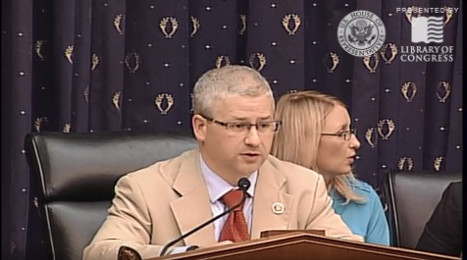CFPB Discrimination Settlement Questioned by Lawmaker

Rep. Patrick McHenry questions CFPB director Richard Cordray during a U.S. House hearing on Wednesday.
By subscribing, you agree to receive communications from Auto Remarketing and our partners in accordance with our Privacy Policy. We may share your information with select partners and sponsors who may contact you about their products and services. You may unsubscribe at any time.
WASHINGTON, D.C. –
As two more individuals testified this week alleging discrimination at the Consumer Financial Protection Bureau, Rep. Patrick McHenry and CFPB director Richard Cordray clashed over how a current bureau employee received settlements to satisfy claims.
Corday acknowledged the CFPB resolved claims involving Angela Martin, who said she was the victim of discrimination and retaliation dating back two years. During a hearing held by the U.S. House Financial Services Committee this week, McHenry pointed out to Cordray that the CFPB has a “zero tolerance for workplace discrimination and retaliation.”
McHenry then asked whether the alleged perpetrator of the discrimination in the Martin case — Scott Pluta — has been disciplined or dismissed.
“I do not have a basis for disciplining Mr. Pluta,” said Cordray, who later referenced that an examination conducted for the CFPB by the Defense Investigators Group, “proved to be defective. We’re now reopening that investigation and working through it.”
That reply triggered a barrage of questions from McHenry, who also chairs the House Committee on Financial Services Subcommittee on Oversight and Investigations who subpoenaed Martin.
“So, you have not fired someone based on the financial terms of the settlement? It’s clear to me that there is truth in this if you’re going to make such a financial settlement with an employee,” McHenry said. “Likewise, if you’re going to issue taxpayer funds to someone to settle a discrimination and retaliation claim, yet on the other side of the ledger not hold someone accountable, it seems irresponsible to me.”
Subscribe to Auto Remarketing to stay informed and stay ahead.
By subscribing, you agree to receive communications from Auto Remarketing and our partners in accordance with our Privacy Policy. We may share your information with select partners and sponsors who may contact you about their products and services. You may unsubscribe at any time.
The North Carolina Republican then turned to Cordray and asked, “How would you see it differently?”
Cordray said, “You said things have been proven. They have not been proven. There is an investigation ongoing.”
McHenry interrupted and asked, “So, you have given taxpayer money based on a frivolous claim?”
Cordray replied, “I don’t know if it was frivolous. It has not been proven.”
The independent investigator assigned to Martin’s case corroborated the alleged discrimination during her House testimony back in April. Misty Raucci is a former investigator at Defense Investigators Group, a firm based in Hanson, Mass., and told lawmakers that she spent six months investigating Martin’s claims.
“I became a veritable hotline for employees at the CFPB, who called to discuss their own maltreatment at the bureau, mainly at the hands of Scott Pluta or Dane D’Alessandro,” Raucci said. “The sum of my findings was that Scott Pluta retaliated against Angela Martin after she filed a formal complaint of discrimination and retaliation.
“In concert with at least three facilitators, Mr. Pluta effectively removed Ms. Martin from her position as chief counsel of consumer response, and saw her relegated to a lesser position in another office. Mr. Pluta attempted to justify Ms. Martin’s removal by expressing doubt as to her ability to perform her duties as chief counsel; however, his criticisms largely occurred after she filed her complaint. This was a major indicator that Mr. Pluta’s rationale for demoting Ms. Martin for what he perceived as shortcomings was masking his other motives,” Raucci continued.
More Allegations Aimed at CFPB
McHenry conducted another subcommittee hearing this week when lawmakers heard from two more witnesses who claimed discrimination at the CFPB. Those individuals included:
— Ali Naraghi, an examiner for the Southeast region within the CFPB’s Division of Supervision, Fair Lending and Enforcement
— Kevin Williams, a former quality monitor within the Office of Consumer Response at the CFPB
“I am the naturalized U.S. citizen that Bureau management referred to as an ‘f’ing foreigner.’ I take great pride in serving my country for 14 years with distinction at the Federal Reserve Board of Governors prior to joining the bureau at its inception and am proud of my Persian heritage,” Naraghi told the committee.
“Like many others, I feel fortunate to have immigrated to the United States, and do not deserve to be referred to in derogatory terms by bureau management,” he continued.
Williams also referenced several racial incidents during his time at the bureau.
“Make no mistake about it. It was clear that I was treated this way and allowed to be treated this way by my few black managers at the bureau because of the ‘plantation’ mentality that exists there,” Williams said. “If my managers had been white, instead of black managers allowed to mistreat a black male, every civil rights organization in America would have protested my treatment, and the treatment of others in my unit.”


